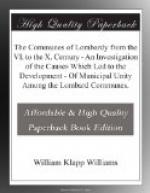Brunetti: Codice Diplomatico Toscano. Firenze, 1806.
Canciani, Paolo: Barbarorum Leges Antiquae, etc. Venetiis, 1781-1792. (Formulae Baluzii, Marcolfi & Mabillon.)
Chronica Farfensis. v. Muratori: Script. Rer. Ital., Tom. II., Pars II.
Eichhorn: Deutsche Staats- und Rechtsgeschichte. Goett., 1803-23.
Fumagalli, Angelo: Codice Diplomatico S. Ambrosiano. Milano, 1805.
Hegel, Carl: Geschichte der Staedteverfassung von Italien. Leipzig, 1847.
Leo, Heinrich: Verfassung der lombardischen Staedte. 1820.
Liutprandus Ticinensis: Opera, v. Pertz, Monum.; Script., Tom. III.
Lex Salica. v. Canciani: Barbar. Leg. Antiq., Tom. V.
Lupo, Mario: Codex Diplomaticus civitatis et ecclesiae Bergomatis, etc. Bergomi, 1784-1799. Vols. 2.
Mabillon: De Re Diplomatica. Parisiis, 1709. (General Collection.)—Annales Ordinis S. Benedicti. Parisiis, 1703-39.
Macchiavelli, Nicolo: Istorie Florentine, v. Delle Opere, Tom. II., ed. Milano, 1804.
Migne: Patrologiae Cursus Completus, etc. Series Latina.
Muratori: Scriptores Rerum Italicarum. Mediolani, 1723.—Dissertazioni sopra le Antichita Italiane, etc. Roma, 1755.
Otto (Freising): Chron.
Pertz: Monumenta Germaniae Historica, etc. (Diplom.; Leges; Script.)
Paulus Diaconus: De Gestis Langobard. v. Muratori: Script. Rer. Ital., Tom. I.
Savigny: Geschichte des Romischen Rechts im Mittelalter, etc.
Sismondi: Histoire des Republiques Italiennes du Moyen Age. Paris, 1840.
Tacitus: Germania.
Tiraboschi, Girol: Storia della Badia di S. Silvestro di Nonantula, etc. Modena, 1784-1785.
Tomasini, Ludov.: Dei Benefizii.
Tommasio: Historia sanese.
Troya: Delia Condizione dei Romani, etc.
Ughelli: Italia Sacra. 10 vols. fol. Venetiis, 1717-1722.
Collections of documents in the Archivii of
many cities of Northern
Italy.
N.B.—The above list is restricted to those works to which direct reference is made in the text and foot-notes.
FOOTNOTES:
[1:] Paulus Diaconus: De Gest. Lang., Lib. II., c. 32. v. Muratori: Script. Rer. Ital., T. I., p. 436. The Gothic system was to take one-third of the land itself from the conquered people; the Lombards on the other hand took one-third of the produce, “frugum.”
[2:] With the growth of society and the increase of population, the milites gain added power, and become the “catanei,” the barons of the period, or as some are pleased to call them, the “rural counts.”




